CEO Of Endpoint Adam Jessop Talks Laying The Foundation For Their Esports Legacy
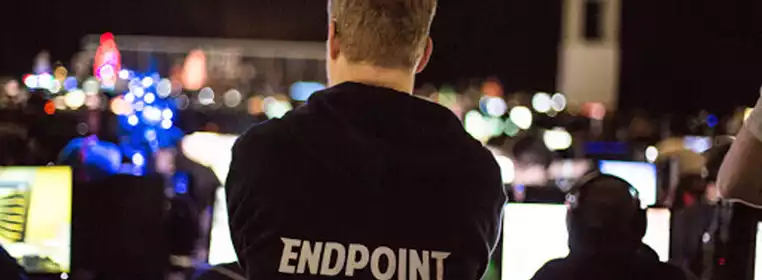
British esports has had an inconceivable year. In the midst of the mayhem surrounding the world, the British esports scene thrived, with players and teams making an impact on a multitude of titles across the globe.
Endpoint CeX, based out of Sheffield, England, has risen through the ranks as the pioneer of British esports throughout 2020, becoming the UK Organisation of the Year. With the world crumbling around us, the organisation boasted their most successful year to date and have come through the storm with barely a scratch on their heads.
Most of this can be put down to their rigid and thorough game plan, allowing them to jump over hurdles with one core value: pushing Britain to the limits, setting a benchmark across the country as a place that believes in its home talent.
Adam Jessop has laid every brick of the foundations for Endpoint, and we sat down with him to discuss everything from the conception of the organisation, to the impact that the coronavirus had on them, and dove into their Rocket League, Counter-Strike: Global Offensive (CS:GO), and Rainbow Six: Siege teams.
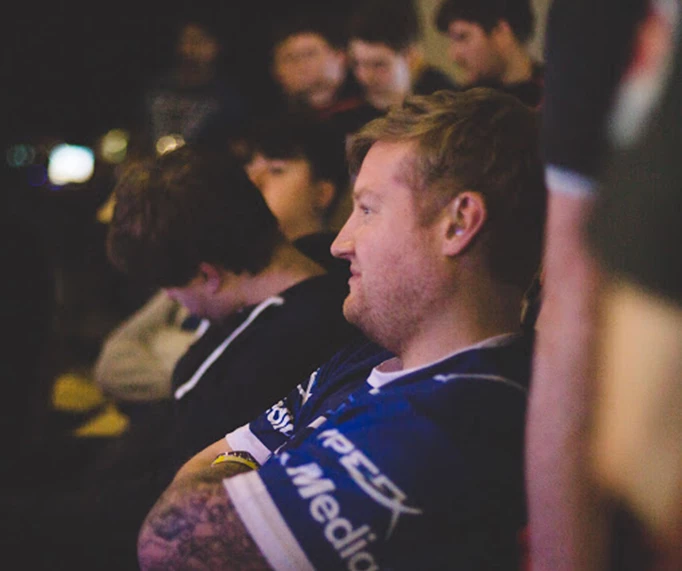
 Click to enlarge
Click to enlargeSo, who is Adam Jessop and what is Endpoint all about?
I’m Adam Jessop, and I’m CEO of Endpoint Esports. We’ve been going since 2016, and we started because I’ve personally been involved with esports for a number of years, playing annual tournaments way back in the day, then playing Call of Duty:1 and 2 and going to LAN events when there were just 50 people there on the ground floor of Newbury racecourse.
In the mid-2000s, around 2004/05, I started a team called “Infused”, a UK team, and we did a good job with it - it grew quite rapidly. We attended the MLG World Finals in Seattle playing Gears of War, we attended the ESWC playing Quake 3: Arena, and we had a fair bit of success there. Then around 2009/10, I’d graduated from University – I’m a web designer by trade, a web app developer – and I was under pressure from my family and various different things. At that point I decided to walk away, sold my shares in Infused, and took a step back from esports.
At that time we were in a global economic depression and sponsors were one of the first things that pulled the plug, so I spent the next few years still watching esports and being engaged with the community, but I realised that whilst esports was blowing up globally, with League of Legends coming out (that took the esports scene by storm) and Twitch came out making esports more accessible to millions of people, here in the UK for whatever reason we were still quite stagnant. North America was blowing up, and mainland Europe was, but here (discounting Fnatic as they are a global brand and have always been that way, and I don’t necessarily see them as a UK brand as they’ve superseded that and it would be a discredit to do so) the only highly successful team we had that was competing domestically - and doing a very good job of it - was Dignitas.
When Dignitas was bought out by the Philadelphia 76ers, it left a really big gap in the market, and nobody was really poised to take advantage of that. So, I kind of thought, ‘you know what, I’m in a better situation than I was before, financially, so why not give this another shot?'.
And from there I created Endpoint and decided to make a shot of this by learning on lessons given from the first time around.
The focus was always around UK esports and can we push UK esports to get to that next tier? Because we’ve kind of been a meme for a few years, and whilst there is a good level of playing talent now, when teams and players have risen to a certain level they are bought by overseas investors and organisations, and nobody here in the UK has been able to retain that. That really was why the whole organisation was set up, to be a benchmark for UK esports.
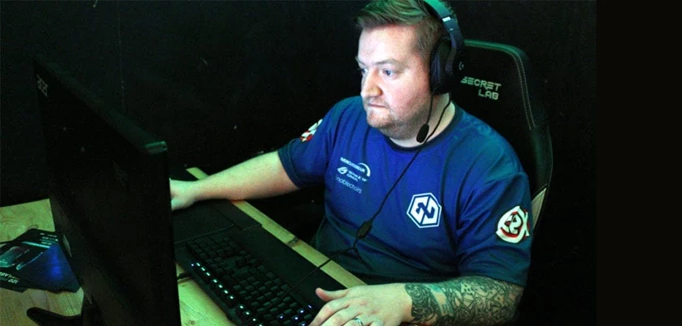
 Click to enlarge
Click to enlargeWas it just yourself who birthed Endpoint, or did you receive help from family, friends, or business partners?
Originally I set out to pair with two guys that I knew from Infused. I’d worked alongside them back then, and we got talking about whether we fancied getting back involved and doing something. Unfortunately, it quickly became apparent that my situation was much different from theirs. They were working more traditional full-time jobs and didn’t quite have the financial flexibility that I was fortunate to have. At that point I wanted to push this a little faster than they were able to do, so no hard feelings, but we split, and I focused on endpoint alone until I met Peter in 2017 at the Copenhagen Games.
He was there with another esports organisation that he was working for at the time: Imperial. We sat down over a beer, as you do, and he was telling me about his situation where he had time and flexibility that his partners didn’t, and he was having a struggle pushing them on. I told him how I broke loose from my partners for the same reasons, and we realised that we have a lot of similar thoughts and mindset on how we want to push UK esports, and so not long after that conversation Pete left Imperials and came on board with me.
As things stand now, we’re pretty much 50/50 in our split. We evenly manage the workload between us and the company is split between us. It’s really been a great partnership so far.
You mentioned that you want to transcend UK esports, do you feel that you’ve contributed towards that at this point in Endpoint’s life tenure?
I’d like to think so.
Way back in 2016 we were the only UK organisation that was trying to subsidise players and give them some money towards being able to compete. I’m not saying that we were paying full-time salaries at that point because we weren’t, but we recognised that it was the way we needed to go. We needed to make sure that players knew this was a place to come and get some compensation for the efforts that they’re putting in.
When Gfinity Elite Series came along, we were the youngest team to be invited into that because of the credibility that we had gained throughout the community for trying to drive professional esports within the UK. I think that the community actually put pressure on Gfinity to include us in the end, and they did, which was great. So I would like to think that we have done that [make a contribution to transcending UK esports].
I mean now, with Counter-Strike: Global Offensive, we’re the only UK CS:GO team to make the HLTV top 30, and we have a lot more achievements that we can be proud of in that area.

 Click to enlarge
Click to enlargeMentioning that your first ventures were impacted by the global recession is almost a foreshadowing of the situation we all find ourselves in now. How has coronavirus affected Endpoint? Has it been very problematic, or was there anything in place that could help deal with a crisis like this?
I don’t think anybody could prepare for this [laugh]. It kind of came from nowhere, and I think it took everybody by surprise. For us at Endpoint, it has certainly changed our plans for the year. We had big plans. We were about to open facilities here in Sheffield, and we were going to have our own training complex and office set up. We were actually just a week away from signing the lease on a property, and then lockdown happened. I’m kind of glad it was that way around though, otherwise we would be paying for a building that we can’t use at the moment. So really we had to refocus. We had to take a step back, and the funding behind that move was put on hold as well.
But having said that, there have been ways in which we have benefitted from the virus, if anybody can really take benefits. There have been more eyes on esports than ever before. There have been more people watching esports and taking part in it, and as much as many people don’t like the link between esports and betting at the end of the day, this was the only thing anybody could bet on for a large chunk of the year. Football was stopped, all the traditional sports calendars were stopped, and esports was the only thing that bookmakers could really put on. I think that has helped.
Now we’re in a position where broadcasters like BLAST, with the event that we’re taking part in, is on BBC iPlayer. We’ve had more mainstream media exposure widely, because their regular schedule has been on hold.
Just touching on what you were saying about mainstream media, coming primarily from a Rocket League background myself, it’s evident that Psyonix and Epic have been trying to push forward the mainstream media. Do you think that is benefiting Rocket League as a whole?
I think it will do. We saw Rocket League on BBC for example, and other mainstream media channels when we were in the Gfinity series, and I do think that brought an audience to Rocket League because the thing that game has, unlike other esports, is that it’s a fairly simple concept.
It’s easily digestible, isn’t it?
Yeah, you can take it to the surface and say that it’s football with cars and people will instantly picture what it is like. I mean, sure there is an insane skillset, a high skill ceiling with a lot of mechanics that you have to get your head around, but on the surface, you don’t really need to know more than that.
When you look at other esports titles like your Counter-Strike, there is the whole politically correct debate surrounding it, League of Legends or Dota 2 are very hard for a casual gamer or newcomer to get their head around, and so I think that Rocket League is the one where if mainstream media broadcasters really took it on then we would see a large jump in recognition within Rocket League and participation.
Do you think that is why it was chosen to be one of two games to be played in the Olympic Games [for the first time ever]? Purely because it is so easily digestible in comparison to any other games?
I do, and I think that the fact that it really is a fun game to watch. Unless you’re an organisation owner and in that case, it can make it a bit tense at times, ha-ha. But that’s the beauty of it as a fan, as an observer. The fact that it is a bit like Basketball with “buzzer beaters” and anything can change in an instant. Someone overthrows possession and conceded as a goal in the last minute; it can change in a heartbeat. It’s got everything about it at the moment for me that I think makes a great esport.
Sticking with the subject of Rocket League, and the impact of the virus, how has the lack of LANs affected you? Because I know you have players such as Otto "Metsanauris" Kaipiainenwho thrives as LANs, and the crowd absolutely love him, has he, or the organisation as a whole, felt the effect of not having live games?
I think we’ve all missed them, for sure. It’s not just the spectacle of a LAN; it’s also the social aspect of them too. I think everyone has missed live events and we’re all hoping that they come back safely sooner rather than later.
As an organisation, we attended DreamHack with the Counter-Strike guys at the beginning of the year, and that was our last live event, but since then we have been involved in two further DreamHacks, and we were in the EU Fall Split Major in Rocket League. I know Psyonix are really keen to push for offline events, as they see that as a spectator that is where you get the most value, right, as you are part of the atmosphere.
If you’ve ever been to a Rocket League event, you will know what that atmosphere is like.
I think we would have preferred to be at LAN, absolutely, not only because of the fact that it is a spectacle and a social outing but also because we’re restricted to a European playing region right now.
We can’t put ourselves up against the North American teams or the SAM and Oceanic regions either. It would be nice to open that pool of competition again once offline events are back.
What I will say too is that most organisers have done a really good job of making the best of the situation. The Psyonix decision to make the Major per region and redirect the prize funding was commendable, the online production has been great, as a fan it has been easy to follow and engage with. It’s just a shame that we miss that physical atmosphere.
In terms of Epic and Psyonix, Endpoint was one of 13 organisations that participated in the letter to the developers prior to RLCS X which discussed a lack of communication between the league and owners, conditions surrounding slot ownership, and prize money distribution. Do you feel that they have taken into consideration your thoughts and put the things that you proposed into practice?
I think that they are more open to communication. I don’t think that they’ll mind me saying this, we’ve never had the clearest communication channels between us as organisations and Psyonix, and that’s by their own admission as well. But I think these days we have more of a seat at the table if you like, and we do have input into that.
Fundamentally there are things that I cannot discuss, but there are also things that are ingrained into the way that Psyonix and Epic do things that are always going to be a longer conversation. It’s not like Psyonix will ever put a poll out and say ‘oh, do you think teams should have ownership spots?’ and take the answer as ‘cool let’s do it’. I think that is going to be a long journey, but as I said, I do think that they are open to conversations more and communication is certainly much improved. We got a heads up that the format for RLCS X was changing, which was good, rather than finding out through a blog post. So it is good that we have that better communication now. Whether we will see any major dramatic shift in dynamics, I don’t know yet. It’s still early.
When the switch in format occurred, how as an organisation and the team itself almost change your entire schedule, with practices and events coming thick and fast? How did you manage the side going into the hectic new schedule?
I guess on the flipside of this argument is that one of the prior problems with the format prior to RLCS X was that Rocket League players are playing a tier 1/ tier 2 esport, right, and they are just a small team, but there are salaries and things that you have to pay. If you’re paying the level of salaries that sometimes Rocket League players expect, the problem is that there are only two main events per year. So for six months out of twelve, or more, there was no competition for them to take part in. So having a fuller calendar was one of the main messages that we had as organisations. It was the fact that we love Rocket League, we just want more of it.
If RLCS X has done anything, it has addressed than and then some. Are we too far the other way now? I don’t know. As an organisation, I’m inclined to say no, let them work for it haha. But obviously, player fatigue and burnout are very real, and we have to manage that.
That is where we ensure that the players have a say on how they find the format and whether it is too demanding or not.
But again, if you look at it through the perspective of a fan, the more action, the better as they get to see the teams that they are following at more events and in different kinds of competitions.
The addition of The Grid, the addition of The Regionals, and the addition of the multiple Splits then going into the major, I think it is a really good format. The fact that it is delivering more Rocket League to fans is a huge benefit. You do really have to have it in the back of your mind though that the players feel like they’re not overcommitted.
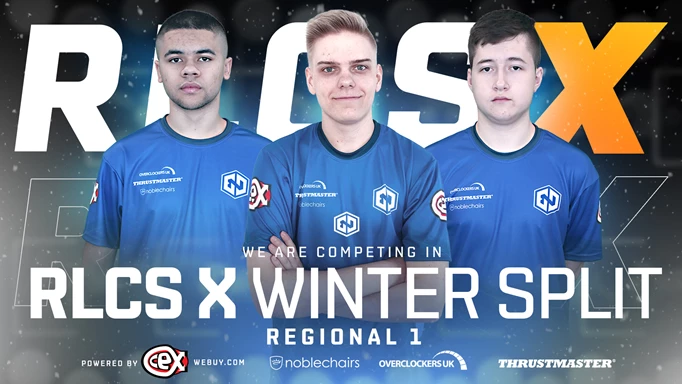
 Click to enlarge
Click to enlargeThe opposite could be said for CS, where a lot of pros have been publicly open about suffering from burnout over the last year, especially when everything was switched online due to the pandemic. Many large CS players were open about being on the grind every single day with the same background, same screen, the same wall that you are staring at having an effect on them. But the organisers have done the reverse of Psyonix, with the likes of ESL dialling back the calendar and switched to offline events in a bubble setting (as proposed for 2021), do you feel that this will benefit your CS players at all?
It’s a strange one, as a CS team our guys have been the busiest that they ever have been this year. Within the six months from the start of the year until about June and even beyond that, we were the most active team on HLTV. I think we ended up playing something crazy like 1.3 maps per day of official competitive matches [not including practices and scrims]. But we know player burnout is very real, and so we made sure that our players took full advantage of the player break in August, because you could see prior to it that our players started to become mentally fatigued, and they’d kind of played themselves into the ground.
It’s always a difficult balance, as it is with any sport, you’ve got to maintain that standard of competing to a high level consistently but also having the time to practice, to come up with new ways of competing or new ways of playing. I feel like that balance was certainly lost [within the CS scene] throughout the year.
I feel like that is very indifferent from sports which highlight how incomparable the two are—especially given the size of the teams. In CS you have five players, whereas in say football, for example, you have 11 players, three subs, five squad players, and a whole reserve team that can all interchange easily dependent on form, and it also means that if one player isn’t pulling their weight, then it isn’t as noticeable than in comparison to esports where it is apparent if one player is in a slump which will affect the whole team dynamic.
Yeah, a lot of teams can look at sports and compare it to esports and say ‘but yeah you’re just sat at a desk, and they’re running up and down a pitch’, but studies have shown that the mental fatigue is very similar, the demands on attention and focus are actually more prevalent in esports. Sure, there might not be that extreme level of fitness, but that is increasingly important. You need a healthy body and a healthy mind to be able to stay on top.
I think with Counter-Strike it is kind of different too with the fact that within the game you have the Tier 1 scene which is quite a hectic calendar, but they’re travelling to events all around the globe. They might be competing in an event in America one week, and then they’ll compete in mainland Europe and then the UK or whatever. Not only have they got to balance practice and comps, but they also have to weigh up travel too.
Then you have that Tier 2 level where it’s teams that are trying to get up that HLTV ranking or ESL ranking and in order to do that they’re just playing as many events as they can. That’s the only way that they can progress, to get the recognition or build up as many points/ranking equivalent as needed to compete in the big events. They just have to compete in as many events as they can.
That’s where I think it gets hard because, we’re just outside of the Top 30 at the moment, but we have been in there for consecutive weeks before, and to get there we had to compete in everything.
We’re in every weekly cup like your Nine to Fives, and that’s all you can really do as a Tier 2 team, and you’re almost prompted to exhaust yourself in some kind of way. Then once you get into that top 30, then you start going to the T1 events and have to have that level of consistency and make sure you stay there, which poses a completely different challenge itself.
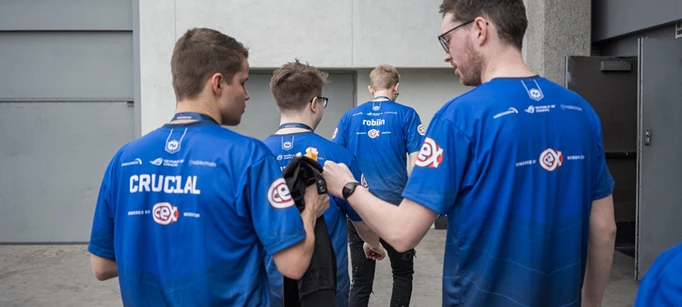
 Click to enlarge
Click to enlargeDo you think there is a way around having to almost exhaust yourself to make the jump from Tier 2 to the elite teams? Like instead of pushing yourself to the limit, would a format where potentially having a pool of all teams that would have to go through qualifiers to join a pool of talent that is automatically guaranteed a spot, akin to how Rocket League do their regional events? Having a more open avenue for T2 teams to make that jump, do you think that will eliminate that exhaustion factor?
To an extent. There are a lot of open qualifiers to events like DreamHack. I think ESL have done a good job to be fair. They’ve laid out this path to be a pro if you’d like where you can compete in the domestic leagues and then the winners will get granted a spot at the global challenges, and you can progress through the levels. If you’re good enough to compete at all of those levels than you create that pathway to be at the top. I think ultimately, we do need more of those.
BLAST do it too with BLAST Rising, in which we came second in, and that was a competition with just those Tier 2 teams. But then on the flip side, we qualified for DreamHack in the summer, and the level of competition was absolutely stacked. Eight out of ten of the top teams in the world were in attendance, so it’s a difficult mix to get right. Ultimately everyone wants to play as much as they can.
Looking at CS, I just want to pick your brains at something G2 Ocelot said regarding the state of the esport. He has been publicly open about the impact of VALORANT and how it could be detrimental to the life tenure of CS, which is surprising considering how long CS has been going for. Do you feel like that VALORANT is an option as opposed to CS:GO, and do you have any plans to expand into it?
VALORANT as a game has a lot of credit to it, and I think it is a good offering. Obviously, they have Riot behind them who you know will do a good job, and it has certainly harmed the UK CS scene a little. A lot of the top level of UK talent has moved over to VALORANT. We sold Thomas “Thomas” Utting to Team Envy in August, and trying to maintain that British identity we wanted to look at the British playing pool and see who was available, but unfortunately, there were very few candidates because the reality was that the usual suspects and names you would look at had already made the move to VALORANT. I do think that it could harm CS in that respects and it has done ion North America as well.
But if anything, the popularity of Counter-Strike is bigger than ever. We’re still seeing the player base numbers be as high as they’ve ever been, viewership is still hitting record levels, and so I think all we will see is the next wave of players come through, we’ll see a younger player-base come up through the ranks and begin to hit the mark.
Regarding us at Endpoint and whether we will be getting involved in VALORANT, I think that it’s a game we have our eye on for sure, because Riot is involved too. From our point, we’re a start-up company effectively, and we run very leanly. We make sure that any project we take on that we have the budget to commit to it and see it through, which is where a lot of organisations fall short by jumping at the chance to sign a team and promise them the world until two months down the line, and they can’t deliver. Right now, we’re not in the position to allocate a budget to a VALORANT project because we know player demands are actually quite high considering the size of the viewership of the scene right now. So it is difficult to justify dipping our toes in right now. We’re not a G2 or a Liquid.
The other side of the argument is that you have to keep in the back of your mind that if VALORANT was to blow up and Riot came along and dis what they did with League of Legends and say that the league’s a franchise now, and you have to pay £20 million to stay in, we certainly don’t have £20 million lying around. So do we want to invest all of this time and resources now if Riot will come and close the gate and say that you need this money to proceed, and we’ll be left thinking ‘what a waste’? But it is something we are keeping an eye on, and it is within our business plans to try and expand into, but I would hate to guess what their roadmap looks like.
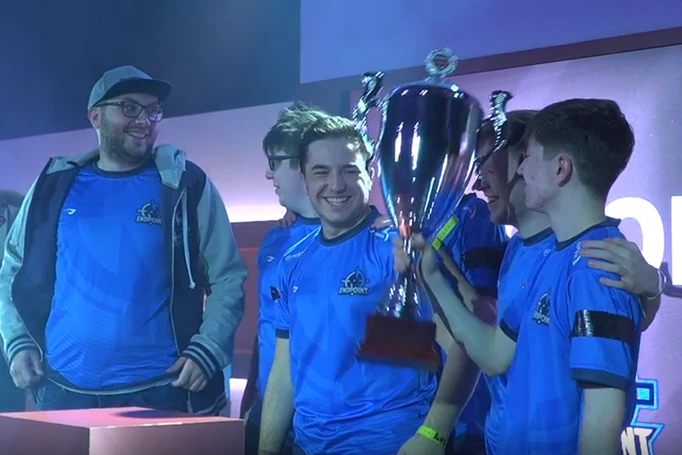
 Click to enlarge
Click to enlargeWhen you were discussing looking around the market looking for UK players, is that something that is fundamental to the roots of Endpoint? Are you always looking to have a dominant UK-based team? I know that you have some overseas talent such as Metsanauris who is Finnish, but keeping the core British, is that something that Endpoint always look to achieve and will maintain in the future?
It’s always been a part of our ethos, and the way that we have always conducted ourselves is that we always try and make sure that we have a strong British representation. We have always had a UK-based Counter-Strike team, up until recently we had a majority of UK players within the team until we sold Thomas, and we struggled to find a British player to replace him. So we ended up signing Shahar “FlameZ” Shushan from Isreal, who has turned out to be an absolute superstar in his own right and it was probably the best thing we ever did. But it is a shame to have lost that core British feel to the team, but as I said, the kid has fit in really well, and it has been an unbelievable pick up for us, so I can’t feel too disgruntled about it.
So, in terms of your future plans, as you begin to scale the HLTV rankings and RLCS table, for example, are you looking to keep the core British or are you looking for better talent that might be available in NA or mainland Europe as you begin to move up in the world?
Because it has been so ingrained into us as an organisation and it has been integral in terms of the way we conduct ourselves and the brands that we work with in the UK, then I do think that we need to make sure we have a strong British representation. We’ve turned down some great opportunities from overseas teams that have come to us with a full German or Dutch line-up, and we’ve always looked at these chances and gone ‘yeah, but there is no British representation’, and that is something that we really want to push.
If you look at our key partners such as CeX, yes they are international, but the majority of their stores are in the UK. Overclock is a British brand with UK consumers. Noble chairs are more European, but the majority of the brands that we work with are British based, so we want to be able to push the consumers that we have and target towards them. Needless to say that if a global brand like Coca-Cola came knocking on our door and said ‘we want you to pick up an American team, and we’ll sponsor you’, we’re not going to turn that down.
Does that leave you with a glass ceiling? Or do you see Endpoint getting those global opportunities in the future?
I do think that there will be opportunities like that in the future, but for us, it is a valid part of the plan, because we believe in the player base. We know that there are good UK players out there, and we know that the fans are there in the UK, so that’s something that we would always try and champion.
I mentioned earlier that I don’t class Fnatic as a British team and that’s mainly because they’ve never really promoted a UK player-base. Even though they are based in London, they’ve had very few British players. I think they have a Fortnite and FIFA player from here, but actually, in many of their main titles, they don’t have any British representation in their teams. That’s where we want to differ. Of course, we absolutely want to grow to become a global brand like Fnatic, but we also want to do that with players from the UK.
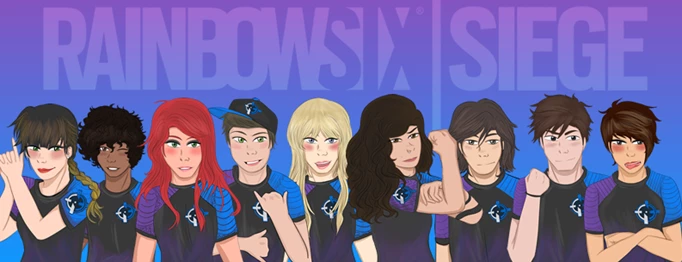
 Click to enlarge
Click to enlargeAnother side that interests me is your Rainbow Six: Siege team. What are your thoughts on the climate of Rainbow Six and how your year has gone since you signed the all-female roster?
We’ve always liked Rainbow Six as an esport, and we’ve always wanted to be a part of it. But it goes back to the whole budget situation. We didn’t have the budget to go out and pick up a top tier team to try and make it into the pro league, and at the same time we’re very passionate about female representation within esports, and I feel it’s hugely important to promote that. So when the opportunity came around, we sat down and thought that it makes perfect sense. We can be involved in Rainbow Six and engage with that community but also promote females in esports.
This year, covid hasn’t helped. Because they’re not a full-time team they’ve had other work obligations, and we’ve not been able to send them to the smaller events that we had on the calendar because they’ve simply been cancelled. So, I do believe that it has harmed their growth within Rainbow Six, unfortunately.
But this is not a project we plan on giving up any time soon. We want to keep supporting the girls and make sure that they have what they need to keep competing.
I know that they’ve undertaken some roster changes recently, but we review these things to make sure that all parties are happy with the direction that we’re going in.
Do you think the future is bright for the female esports scene? Is this something that Endpoint sees as a long-term approach and will see the female scene grow?
I’d like to think so. We’ve seen it in Counter-Strike. There’s a high level of female competition. But at the same time, I’d like to see more mixed competitions. There are no restrictions around having mixed-gender teams, and unfortunately, it’s a more of a cultural thing. I think teams and organisations need to be more aware that there are some really skilled female players out there and I think that if they are given the chance to compete at play in teams alongside male peers, then they would do really well. Generally speaking, some females prefer to compete in all-female competitions, and I think it is important to have both on offer.
I know within Rainbow Six that we’ve competed in female-only competitions in the past, and that there is talk of more in the future with a league due to being announced, although preparations for that have been hindered due to covid. But I’m hopeful.
Just to round everything off, what’s next for Endpoint? I know it’s an impossible climate to look forward past, but what are the plans for you in the future?
We’re just reaching the end of our most successful year to date. On the business sides of things, we have seen growth that was unprecedented at the start of the year. 2020 started with us changing our brand, picking up the RLCS team, but really, we weren’t expecting to see the growth that we have gained. We won Organisation of the Year in the UK Esports Awards, and so it’s just building on that. We want to make sure that going into 2021 that we keep leading from the front and evolve, continue giving the competing teams our full support, grow out streaming teams, and kind of become a family.
We’re very proud of the foundations that we have built, and it’s just a case of we need to make sure that we build on top of that. This year and all of our success wouldn’t have been made possible without our partners, CeX especially, so we want to see our partnership grow.
The facility is very much still in the pipeline, and we look forward to announcing more plans like that in the future.
Stay up to date with all the latest esports and gaming news by checking out our social channels here: Twitter | Facebook | Discord
Image via Adam Jessop